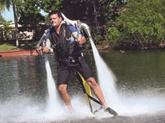
科目: 來源:不詳 題型:閱讀理解

 boat is a floating pod. To take off, the operator hits a trigger on a handlebar, which starts the pump, and then turns the throttle. Two streams of high-velocity water shoot through the hose and out the nozzles, lifting the operator into the air. The operator hovers there or pushes down on the handlebars, zooming forward at speeds of up to 64 kilometers per hour, pulling the pod behind.
boat is a floating pod. To take off, the operator hits a trigger on a handlebar, which starts the pump, and then turns the throttle. Two streams of high-velocity water shoot through the hose and out the nozzles, lifting the operator into the air. The operator hovers there or pushes down on the handlebars, zooming forward at speeds of up to 64 kilometers per hour, pulling the pod behind.| A.excessive water | B.unbearable noise | C.unsafe fuels | D.too much weight |
| A.improved | B.reduced | C.a(chǎn)voided | D.solved |
| A.exciting | B.crazy | C.realistic | D.creative |
| A.His friends encouraged him to do the invention. |
| B.He put the engine and its water pump in the same boat. |
| C.The success of his invention lies in his bravery. |
| D.His invention finally succeeded and will go into production. |
| A.c, e, a, d, b | B.c, e, a, b, d | C.e, c, d, b, a | D.e, a, c, d, b |
查看答案和解析>>
科目: 來源:不詳 題型:閱讀理解
查看答案和解析>>
科目: 來源:不詳 題型:完形填空
查看答案和解析>>
科目: 來源:不詳 題型:閱讀理解
查看答案和解析>>
科目: 來源:不詳 題型:完形填空
查看答案和解析>>
科目: 來源:不詳 題型:閱讀理解
查看答案和解析>>
科目: 來源:不詳 題型:閱讀理解
查看答案和解析>>
科目: 來源:不詳 題型:閱讀理解

 _.
_.查看答案和解析>>
科目: 來源:不詳 題型:閱讀理解
查看答案和解析>>
科目: 來源:不詳 題型:完形填空
 C. personality D. identity
C. personality D. identity查看答案和解析>>
湖北省互聯(lián)網(wǎng)違法和不良信息舉報平臺 | 網(wǎng)上有害信息舉報專區(qū) | 電信詐騙舉報專區(qū) | 涉歷史虛無主義有害信息舉報專區(qū) | 涉企侵權(quán)舉報專區(qū)
違法和不良信息舉報電話:027-86699610 舉報郵箱:58377363@163.com